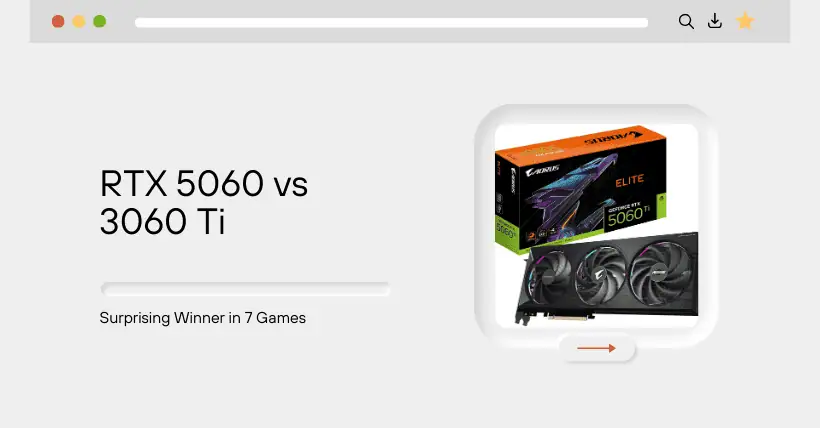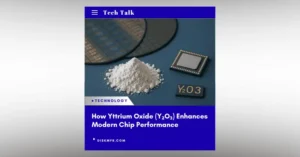I. Preface
There’s a saying in the tech community: upgrade every other generation. In other words, whether it’s a processor or a graphics card, upgrading after just one generation often yields minimal performance gains—only products that are two or more generations apart are truly worth upgrading to.
That said, the GeForce RTX 5060 faces a formidable and hardcore rival in the GeForce RTX 3060 Ti. In terms of price, CUDA core count, and memory bus width, the RTX 3060 Ti surpasses the RTX 5060. However, the RTX 5060 does hold certain asymmetric advantages, such as its architecture and manufacturing process.
This article compares the gaming performance of the GeForce RTX 3060 Ti and the GeForce RTX 5060. While the RTX 5060 is expected to be stronger, the key question is: by how much? This article will provide the answer.
II. Specifications Comparison
The GeForce RTX 3060 Ti was released on December 1, 2020. It uses the GA104 GPU, based on the Ampere architecture, manufactured with Samsung’s 8nm process. It has 4864 CUDA cores, 152 texture units, 80 raster units, 38 ray tracing cores, 38 streaming multiprocessors, 152 tensor cores, and 4MB of L2 cache.
Its base clock is 1410 MHz, with a boost clock of up to 1665 MHz. It comes with 8GB of GDDR6 memory running at 14 Gbps, a 256-bit memory bus, and a memory bandwidth of 448.0 GB/s. FP32 performance is 16.20 TFLOPS, power consumption is 200W, and the suggested retail price is $399.
The GeForce RTX 5060 was released on May 19, 2025. It uses the GB206 GPU, based on the Blackwell architecture, and built with TSMC’s 4nm process. It has 3840 CUDA cores, 120 texture units, 48 raster units, 30 streaming multiprocessors, 120 tensor cores, 30 ray tracing cores, and 32MB of L2 cache.
Its base clock is 2280 MHz, with a boost clock up to 2497 MHz. It also comes with 8GB of GDDR7 memory at 28 Gbps, a 128-bit memory bus, and a memory bandwidth of 448.0 GB/s. FP32 performance reaches 19.18 TFLOPS, power consumption is 145W, and the suggested retail price is $299.
III. Test Platform Configuration
Main configuration is as follows:
The CPU is a Core i5-12400F, the motherboard is a Gigabyte Z790 Gaming X AX, memory is 32GB DDR5-6000, graphics cards are the GeForce RTX 3060 Ti 8GB and the GeForce RTX 5060, storage includes an ADATA XPG S40G 512GB SSD and a Samsung 870, and the operating system is Windows 10.
IV. Game Testing (RTX 5060 vs 3060 Ti)
The following tests cover seven games at 1080P resolution. In each image comparison series, the left side represents the GeForce RTX 3060 Ti platform, and the right side represents the GeForce RTX 5060 platform.
Game 1: Alan Wake 2
- RTX 3060 Ti: Avg FPS: 59, Min FPS: 42, Frame Time: 13.8ms, CPU Usage: 31%, Power: 34W, Temp: 42°C, Memory: 9.8GB, GPU Usage: 96%, VRAM: 5.7GB, GPU Power: 192W, GPU Temp: 64°C
- RTX 5060: Avg FPS: 61, Min FPS: 44, Frame Time: 14.6ms, CPU Usage: 28%, Power: 39W, Temp: 49°C, Memory: 12.3GB, GPU Usage: 97%, VRAM: 6.4GB, GPU Power: 130W, GPU Temp: 62°C
CPU usage is 3% lower on RTX 5060, memory usage is 2.5GB higher, GPU usage is similar, VRAM usage is 0.7GB higher, GPU power consumption is 62W lower, and temperature is 2°C lower.
FPS difference is minimal (+2 FPS), with nearly equal frame times – overall a tie.
Game 2: Spider-Man 2
- RTX 3060 Ti: Avg FPS: 103, Min FPS: 42, Frame Time: 9.8ms, CPU Usage: 49%, Power: 54W, Temp: 54°C, Memory: 14.1GB, GPU Usage: 96%, VRAM: 6.5GB, GPU Power: 194W, GPU Temp: 72°C
- RTX 5060: Avg FPS: 120, Min FPS: 60, Frame Time: 8.0ms, CPU Usage: 57%, Power: 56W, Temp: 58°C, Memory: 16.1GB, GPU Usage: 94%, VRAM: 7.4GB, GPU Power: 110W, GPU Temp: 60°C
CPU usage is 8% higher, memory usage is 2GB higher, GPU usage is 2% lower, VRAM usage is 0.9GB higher, GPU power is 84W lower, temperature is 12°C lower.
FPS is 17% higher (+17 FPS), min FPS +18 FPS, frame time 2ms lower – clear win for RTX 5060.
Game 3: Cyberpunk 2077
- RTX 3060 Ti: Avg FPS: 80, Min FPS: 60, Frame Time: 11.7ms, CPU Usage: 49%, Power: 53W, Temp: 54°C, Memory: 10.7GB, GPU Usage: 98%, VRAM: 6.2GB, GPU Power: 196W, GPU Temp: 69°C
- RTX 5060: Avg FPS: 94, Min FPS: 76, Frame Time: 10.5ms, CPU Usage: 47%, Power: 51W, Temp: 57°C, Memory: 12.1GB, GPU Usage: 96%, VRAM: 7.2GB, GPU Power: 129W, GPU Temp: 62°C
CPU usage is 2% lower, memory usage is 1.4GB higher, GPU usage 2% lower, VRAM 1GB higher, GPU power 67W lower, temp 7°C lower.
FPS is 18% higher (+14 FPS), min FPS +16 FPS – clear win for RTX 5060.
Game 4: God of War
- RTX 3060 Ti: Avg FPS: 100, Min FPS: 82, Frame Time: 9.5ms, CPU Usage: 36%, Power: 42W, Temp: 57°C, Memory: 14.2GB, GPU Usage: 99%, VRAM: 5.9GB, GPU Power: 198W, GPU Temp: 75°C
- RTX 5060: Avg FPS: 115, Min FPS: 97, Frame Time: 7.8ms, CPU Usage: 38%, Power: 45W, Temp: 54°C, Memory: 13.4GB, GPU Usage: 97%, VRAM: 6.3GB, GPU Power: 124W, GPU Temp: 61°C
CPU usage +2%, memory usage -0.8GB, GPU usage -2%, VRAM +0.4GB, GPU power -74W, temp -14°C.
Avg FPS +15%, min FPS +15 FPS, frame time 2ms lower – strong win for RTX 5060.
Game 5: Monster Hunter: Wilds
- RTX 3060 Ti: Avg FPS: 56, Min FPS: 48, Frame Time: 17.8ms, CPU Usage: 50%, Power: 41W, Temp: 51°C, Memory: 16.3GB, GPU Usage: 98%, VRAM: 6.7GB, GPU Power: 171W, GPU Temp: 67°C
- RTX 5060: Avg FPS: 68, Min FPS: 41, Frame Time: 13.0ms, CPU Usage: 58%, Power: 57W, Temp: 61°C, Memory: 17.3GB, GPU Usage: 93%, VRAM: 6.8GB, GPU Power: 100W, GPU Temp: 58°C
CPU usage +8%, memory +1GB, GPU usage -5%, VRAM usage similar, GPU power -71W, temp -9°C.
Avg FPS +21% (+12 FPS), but min FPS -7 FPS – trade-off between higher average and lower minimum.
Game 6: Silent Hill 2
- RTX 3060 Ti: Avg FPS: 72, Min FPS: 42, Frame Time: 14.5ms, CPU Usage: 34%, Power: 38W, Temp: 54°C, Memory: 11.7GB, GPU Usage: 98%, VRAM: 7.2GB, GPU Power: 187W, GPU Temp: 70°C
- RTX 5060: Avg FPS: 81, Min FPS: 48, Frame Time: 10.7ms, CPU Usage: 37%, Power: 44W, Temp: 55°C, Memory: 13.2GB, GPU Usage: 96%, VRAM: 7.6GB, GPU Power: 122W, GPU Temp: 61°C
CPU usage +3%, memory +1.5GB, GPU usage -2%, VRAM +0.4GB, GPU power -65W, temp -9°C.
Avg FPS +13% (+9 FPS), min FPS +6 FPS, frame time 3ms lower – clear win for RTX 5060.
Game 7: The Last of Us Part II
- RTX 3060 Ti: Avg FPS: 80, Min FPS: 65, Frame Time: 11.7ms, CPU Usage: 74%, Power: 59W, Temp: 62°C, Memory: 14.1GB, GPU Usage: 98%, VRAM: 7.4GB, GPU Power: 195W, GPU Temp: 72°C
- RTX 5060: Avg FPS: 82, Min FPS: 61, Frame Time: 10.7ms, CPU Usage: 75%, Power: 59W, Temp: 63°C, Memory: 17.4GB, GPU Usage: 97%, VRAM: 7.8GB, GPU Power: 121W, GPU Temp: 61°C
CPU usage +1%, memory usage +3.3GB, GPU usage nearly equal, VRAM +0.4GB, GPU power -74W, temp -11°C.
Avg FPS +2 FPS, min FPS -4 FPS, frame time nearly equal – overall a tie.
V. Comparison Conclusion
In terms of pure performance, the GeForce RTX 5060 doesn’t offer a significant advantage over the GeForce RTX 3060 Ti. However, when considering overall performance, power consumption, and temperature, the RTX 5060 shows a clear edge—with generally higher performance, significantly lower power consumption by several dozen watts, and lower temperatures by a few degrees.
Based on the combined data, the GeForce RTX 5060 delivers approximately 17% higher performance than the GeForce RTX 3060 Ti. While this gain isn’t huge, achieving it with much lower power and thermal output is quite impressive. That said, for users already running a GeForce RTX 3060 Ti, upgrading to an RTX 5060 isn’t necessary—it would be a marginal and unworthy upgrade. A card two tiers higher would be a better choice.
Related:
- RTX 5060 with Ryzen 5 3600: 7 Games Performance Test
- RTX 2080 Ti Gaming Review: 2025 Performance Tested
- RX 9060 XT vs RX 6700 XT – Which GPU Is Better Now?

Disclaimer: This article is created by the original author. The content of the article represents their personal opinions. Our reposting is only for sharing and discussion purposes and does not imply our endorsement or agreement. If you have any objections, please get in touch with us through the provided channels.








